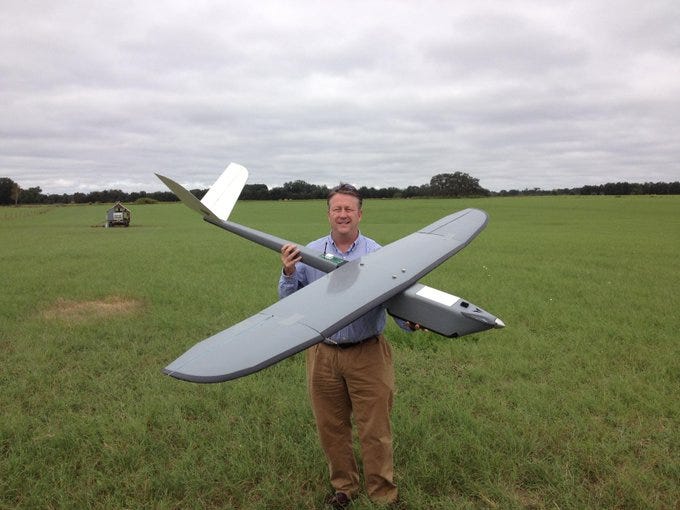Tommy Kenville, Grand Forks Center for Innovation, joins Jason Spiess with The Crude Life to discuss the emerging UAS industry. The interview was conducted in 2013 and quite a bit has changed since then. Five years ago, Kenville left the Center for Innovation to work full-time in the UAS industry.
Currently Kenville is majority owner of Isight Drone Services with offices in Watford City, Fargo and Grand Forks.
According to Isight Drone Services website, in 2011, CEO Tommy Kenville founded Unmanned Applications Institute International (UAI), the first private drone company in North Dakota. Adam Lingwall and Nathan Leben founded Isight Drone Services in 2014, and in 2017, UAI and Isight Drone Services merged to form Midwest Drone Group.
With the purchase of Fargo-based Flight Pros in February of 2020, and the opening of our Watford City office in May of the same year, ISight Drone Services has expanding quickly in the UAS industry.
Transcript of the interview is below.
Support American Entrepreneurs! Click on the image and use the promo code OTIS!
Below is the raw, unedited transcript from our artificial intelligence translator.
Jason Spiess
We're here at the Grand Forks, is it the U. N. D. Center for Innovation? Okay. And just first of all, just kind of a state of the union and about us about the Center for Innovation and what you do here.
Tommy Kenville
Um My title here is Rainmaker. I kind of help everybody whether it's looking for equity, looking for debt, looking for partners, it doesn't matter your industry. One of the big industries we're working on now is the U. S. Industry probably have seven or eight launch companies in the in the center start up all in this industry, some with data, some of manufacturing, some with software.
Um My company, you ai is a consulting business and uh we're working with a lot of people in the state and a lot of the state agencies and the other guy on my team was uh on my team is Doug Mcdonald and he uh he was on the Earth space integration team. And uh so Bruce has kind of created a launching pad for U. A. V. Companies here at the Center of Innovation.
We work closely with Grand Sky, the new tech, the new U. S. Tech park out at the base so people can start here till their facilities get built out there. Um North Dakota is a great place to do business regardless of what it is, but especially us. Um um Go ahead very exciting times uh in this
Jason Spiess
industry, your background is pretty extensive. I don't mean to bother
Speaker 3
you but but you are but I am everything went very well with john okay, he was extremely happy john in Minnesota and CTC.
Tommy Kenville
All right. Um so Stewart is one of the startups, Smart C. Two. He's got a software business and so he has a software business that uh we're helping launch, you know,
Jason Spiess
how does that? Okay so your background and
Tommy Kenville
Us, I had I worked 15 years, I've been in aviation 28 years and um was the vice president of the aviation school next door. Um and then went to work for myself in 2002 and then um um Bruce at the center here said you know write your own business plan, start your own business. And uh uh I ended up getting back into aviation in us when Senator Holden was governor uh he said hey we helped bring this industry to North Dakota. I said sure.
And I had done that in the manned aviation arena kind of got back into it in 2010. I saw a big hole in the industry, you know and he was doing the operator training, Northland Community College was doing the maintenance training and I could see this uh whole for imagery imagery analysts. And so I started our company acquired some imagery analysts curriculum and help getting we're helping get the curriculum out to the
Jason Spiess
industry imagery analysts with that. Was that with optical sensors and everything.
Tommy Kenville
So the U. A. V. Is their value is is their payload what they're taking pictures of. So it could be an uh oil and energy uh good video or infrared or S. R. Video of pipelines and what are you looking for then? You have to take that data and turn it into information. Uh You can do it an egg and so uh they were training the other positions but not the imagery analysts. So we we have an imagery analyst curriculum, geospatial sensing full motion video. Uh
Jason Spiess
You're talking about the technology side
Tommy Kenville
of it. Yeah the pay the camera in the industry, they call it a payload but theoretically it's a camera payload because it's
Jason Spiess
the payload part of the
Tommy Kenville
industry. And so it's a camera. Um What type of camera is infrared is it full motion video and then you get all that data. You need to turn that into information. One thing we've learned is the industry has told us that we're drowning in data. Especially we need information, not more data. So this teaches them how to enter uh to review the data and what to do with it. So we got the curriculum to a couple of schools and a couple of business industry manufacturers biggest news we have is
that we uh we announced a couple weeks ago, the governor did about manufacturing new A. B. S. In north Dakota, calm Dell. And I helped raise all the equity for that deal and got the florida company up here and then calmed l which is an unbelievable manufacturer. So they agreed to expand into this industry and it's now we've got another piece of the U. A. V. Puzzle. You know,
Jason Spiess
I've heard that off the record anecdotally. However, you might say that the U. A. U. S. U. A. V. Industry could be the third largest in North Dakota in the next five years.
Tommy Kenville
Yeah, it all depends what the FAA does um It definitely has potential to be very large. I don't know about third. I mean oil and egg are really big dollar industry. Um I don't see us being close to them in dollar zeros, but definitely a very strong fast growing industry. It
Jason Spiess
seems like the way that I've been reading those comments because nobody's really denied it. But what they'll do is they'll kinda say it, it'll be in competition for the third now every year. But there's times where it could, could be. But the point is, that's how quickly this is gonna grow in North Dakota.
Tommy Kenville
You know, we've been at it for nine years. So it's not overnight. But finally, now the FAA is starting to make big breaks to where we can really fly, where you don't have to be a government agency or school to fly.
Jason Spiess
And and I was looking back at my notes and I believe I interviewed you in 2011 after you were in Israel, is that, was that you okay? And at that time uh the radio station that I was doing the interview for everybody thought you and I were a little bit crazy because you were you were talking about drones the size of honeybees and that technology um four years later just where we at with
technology and drones because four years ago everybody thought we were crazy just having a very introductory conversation and you were over in Israel, you saw it firsthand and
Tommy Kenville
we're a lot further along um the uh I think that this U. A. V. Industry is gonna be a lot like the cell phone industry when it first came out, you know there was 100 phones five, you know? And did they all work? Sure they did. Uh But today what is there? Probably four or five phone manufacturers worldwide, you know they're so I kind of see them doing the same thing. Um you have the large defense contractors who will always have an expensive hammer and build, they build great military
stuff. But who and the entrepreneurs are gonna make it and where is the price point gonna shake out. So it's really exciting times, you know, we picked one, it's called LTV in their building uh A L. T A. V. I. N. And their website is just dot com but they've done very well in mapping and in government contracting and so uh I think they're going to be a winner but I may be wrong maybe right,
Jason Spiess
you
Tommy Kenville
know, but they they've got a good track record and it got a long track record in a new industry and I like their leadership. So they're gonna do all their manufacturing in north Dakota and keep their R. And D. In their headquarters in Gainesville florida
Jason Spiess
Gainesville. I'm on record. First time is when I was speaking with Lynn helms about the U. S. Potential out in the bakken Oilfield. I listened later and apparently I'm on record saying my belief is in order to operate one of these drones in the future, you'll need a pilot's license and FAA license of some sort because of the responsibility. That's gonna come with this. Um Just your comments on that statement by me. Um
Tommy Kenville
Yes and no. Um Yes over a certain poundage, I would believe right now the FAA has got the comment period out for 100 and 20 days. They say a small U. A. V. Is uh smaller than £55. I think a small U. A. V. Should be under £20. Uh because above 20 it's a it's a dangerous object. Um Right now they haven't specified exactly, but my belief is that everyone will have to pass the private pilot ground school and then when you get above the £55 you're correct, private pilot maybe instrument because
they're they're big airplanes. I mean they're they're they're like regular airplanes. But a majority of what gets sold, I believe will be in the under £30 because they can stay in the air for a couple hours. They can get great video or great imagery and you in, they're inexpensive to operate
Jason Spiess
the video portion. Um The privacy portion, what's being addressed there because for every 100 positive applications, one photograph of somebody taking a shower is gonna is gonna be a pr nightmare for the whole industry. What's being addressed? Their
Tommy Kenville
um um Good, that's a great to drop that off. I'm gonna send you mine and I need a one pager at the end of that. Okay. We
Jason Spiess
like to leave this stuff in during the show to
Tommy Kenville
um the that's a good question. I testified against the bill. The state's doing right now, last monday. Um there's a national effort to To tie our privacy to drones. And as you know, I mean, you've got two or three devices on you right now. I have a few, we don't have privacy in general. Um but there's a national effort to try to pin all of our privacy issues on a drone and I don't, we already have the fourth amendment, we already have the Dow Chemical Act of 19 were protected.
Um However, I do believe in today's world, you know, I don't know how far you can walk without being on some kind of camera video. So I do believe overall we maybe should look at this. Um But I don't think it's specifically tied to a drone. And our state politics, one of the politicians is trying to have some rules for the law enforcement, well, they're already in place unless you have probable cause you can't use this footage.
Um, so, so I hope as a state, we don't jump in front of the industry and have laws before their time. Uh, if you interviewed me five years from today, I might have, might say it's time to have some laws. Uh, but I don't want to have our state after we've systematically invested in this industry for many years, worked very hard to get the jobs here to throw up any red flags when it isn't just the drone issue.
Jason Spiess
You hear the other issue about, uh, I think even a county in texas issued a hunting season colorado, colorado. So it's, this is not news here. But uh, the other issue that comes up from time to time, I call it the trespassing issue or the understanding of airspace and trespassing. So just with those two buzzwords uh, have been played into the U. S. Because you know, if, if, if there's no drone trespassing on my private, on my private property, I have no privacy issues correct. ...
Tommy Kenville
Where your private property starts in the air there to um, you know, in a drone is no different than a cellphone or a regular camera. Are people going to use them wrong? Sure they are. People use cars wrong. Sure they do. Um, but I think all in all I think we have were protected.
I mean, uh, you know, If I get a speeding ticket going on I. 29 and I'm doing 85 mph if a police car pulls me over or a drone clocks me or an airplane clocks me all three ways. I'm breaking the law and so I should get stopped.
Jason Spiess
But overall though, um, somebody who's testified as of a week ago, uh, these issues are being discussed. And as North Dakota's one of the test states, these are, these are active as we're doing the interview. Yeah. And that's one of the reasons why we're test state, isn't it? These are, these are new issues are not easy.
Tommy Kenville
We have a very good environment for test and bring this product to market, but we also have to protect our citizens. So um, like I said earlier, I just think, I hope we, we push push it down a little ways because we haven't flown enough to know and you don't have rules for a highway before you have a highway. And I just hope we, we we we don't rush into something that might not be needed.
Jason Spiess
And and you and d. S involvement with this whole US industry um, explain a little bit about that.
Tommy Kenville
Well, they were the number one flight school in the country and I worked there for many years. They have an excellent program. They had the vision to be the first us uh major in the United States, which is great, great forethought on their part. Uh They uh it's one of the faster growing majors at U. N. D. Um From that uh We did a statewide air integration team to win one of the test site. So we had a person from every walk of aviation on the test site uh Integration team who were fortunate
enough to win that When one of the we were the first one named out of six. and we're making good progress but none of the test sites have flown a lot because of the ambiguity and some of the issues with the F. A. So we have to get through that and get in the air and get testing so that we can get these entrepreneurs to march to the marketplace.
Jason Spiess
And so really what we're testing um both the commercial and kind of that military pilot stuff.
Tommy Kenville
Well no mainly mainly we can but the military guys can go test on their own and restricted airspace. It's the private guy like you and me that has a small US that wants to see how it works. Um And you know that we have our C regulations remote controlled aircraft so they can already fly at 400 ft in the line of sight. And that's what a lot of the small US operators are doing. But there's a definite line that if you're gonna do it for hire you can't do it
Jason Spiess
then is that kind of the difference between the R. C. Guys and us is that once the transaction comes into play one of the differences the other one would be weight. And
Tommy Kenville
but the quality of the product is industrial grade or is it home built or There's a lot of differences but that's a big one. Um And so theoretically under today's today's rule you you could buy your own U. A. V. Not know anything about flying it but as long as there's no financial transaction going on you can go ahead and fly but you cannot hire me today who's been flying them for years because you're paying me but I'm an expert at flying them so look at what's safer safer to hire me.
... And but you can go to Verizon right now and buy one and and fly it with the camera and say it's because there's no financial transaction of selling information or being for hire. So we have to work through those issues. Uh It is a little bit uh and and they're they're coming out all over across the country. You A. B. S. I mean they're selling by the thousands and that is one of my worries is the dividing line between a commercial operation and a hobbyist
because you definitely will need a lot of the structure and training like the FAA does for pilots for this because of the separation of airspace and where you can and can't fly and
Jason Spiess
um I'm just thinking about my media business and that's a really great area I would think because you know I'm
Tommy Kenville
well theoretically you're writing a story to sell so then it's for higher. Exactly. On the other side of it is is wouldn't it be great footage if you were at an event or thing and you had the U. A. V. Up and have a three D view of what's happening or
Jason Spiess
I'm just even thinking about my days of uh covering the flood fights. I mean you're talking about where a U. S. Would be absolutely perfect for somebody in the media and maybe I own it personally and maybe it's my own hobby thing. But the final product is for sale essentially because the media is for sale. Hey, I said that.
Tommy Kenville
So I mean and you know the university has a good privacy committee to go through the projects. They've done a lot of things right? I don't know that a lot of industry people are gonna go to the university to see if it's okay to fly. Government agencies will but private industry to go fly a farmer's field, they're not gonna think of that. So we're making good headway.
Some other countries are ahead of us when we talked years ago I just got back from Israel Canada amazon's flying in Canada because it's easier um brazil's easier. Uh some places in europe are easier. So we have to keep the FAA moving in the same token, our airspace is way more complex than those because we have so many users in north in the US. So we have to keep everyone safe. We have to have rules that are acceptable for both sides.
Um and there's some create technology out there. I mean one of the reasons U. A. V. S. Are more safe is their autonomous your program and you take the human error part out. Now human has to watch and observe in case something were to go wrong. What is your procedure? But we haven't gotten procedures like that. Like you do a manned aircraft today, we have to get to that.
Jason Spiess
It takes a lot of risk right out, you know, and and big risk to uh the email I got from the delegation about recently today got a $250,000 grant from a for angel angel funds and seeds. Uh imagine the U. S. Is probably quite a few angel potentials and seed startups. Talk to me a little bit about the funding you guys do and how people can be apart
Tommy Kenville
Bruce. Who was the ceo of the center in 2007 said we needed to have angel funds in the rural America and I had raised money for another project, the Hilton Hotel next door. Uh and pay back the investors early. So he asked me to chair are the state's first angel fund. So I said sure. And uh so now we have six of them. We put small money into startups. Um what what would be
Jason Spiess
Small money under 10,000, you
Tommy Kenville
know 40 to 100,000. Um
Jason Spiess
in my world, that's
Tommy Kenville
that's that's bigger money. But you're you're uh I'm guessing this, but you weren't planning on taking your business to millions of dollars in gross sales per year. You're more of a family business. We wouldn't invest in those, we only invest in high growth companies. Uh we would send you on some type of debt financing through the center.
You know, we'd figure out another form of financing. Equity is really for um maybe a company that's had one or two sales needs to um market or or build the assembly line out or uh they're basically we invest in pre bankable businesses but they have to have high growth potential and every one of those businesses needs one or $2 million. And angels put in uh 50 to 100 and 50,000.
And so we had a Minneapolis company that we just had an exit on that we put $60,000 in. Uh The student fund put some money in the fund, put some money in. So maybe they got 300,000 out of North Dakota. Uh They had a they had a merger or an acquisition last Wednesday so we will get back half of our principal and then stock in the in the new company and it's our closing our, we had a 3.9 X.
Return. So 3.9 times our money and we don't know where the stock price will be now. We've also had four in the angel area is very high risk. So our angel funds in 13 startups, five of them have failed already. So we lost our 60,000, we lost our 100,000. We um but we have 30 28 members in my angel fund. So it's a great way to diversify the risk but help companies and uh the E. D. A. Grant that the center has received is is to help promote do more of that because there isn't enough money in the
funds to charge fees. So it's it's a hard business model in real America to keep those going. And the center of innovation does a great job of of keeping them going. Here's our latest rag you can propaganda. And I would really interview Bruce about the E. D. A. Grant. Yeah he's uh he's more on that side. I'm more on how we invest. Um
Jason Spiess
you're kind of a salesman for salesman.
Tommy Kenville
Uh Bruce has given me the title of The
Jason Spiess
Rainmaker. That's uh and that's
Tommy Kenville
because I helped fix things and and it's about money, you know um you know sometimes it's the smallest little thing of helping somebody with a problem and other times it's finding him a banker or finding him equity or finding him sales. And
Jason Spiess
I think in pulp fiction wasn't that harvey Keitel, the wolf? The problem solver right on. Well, just kind of final thoughts then as far as, um, your perception where North Dakota is gonna be over the next five years.
Tommy Kenville
Well, I'm really excited because we're, we're diversifying our economy and that's key to success to me. Um, you know, eight years ago, the only thing we did in the state on a big level was agriculture. Today we do agriculture and oil and energy. Wind coal on a big level three or five years from today. I don't know that the U. A. V. S. Will be in that big dollar amounts but will be a, will be an international player.
Uh, anyway V. S. Uh, which is great. We're a very strong player in aviation already. Um, and this just kind of fills out, uh, more diversity. And I think the uses for U. A. V. S. Are, are, are in a lot of ways limitless. Uh, I applied for a federal grant maybe four or five years ago. Um, I thought rural fire departments should all have a U. A. V. They're all old guys like us that are under trained and overworked and, and we have to go go to a fire.
Well, think of launching a small U. A. V. It beats all the fire trucks to the fire, takes live photos, send them to your smart phone or your laptop. Hey, this is a chemical file. We need a lot more help. Oh, it's someone, some farmers hay bale back down. It's a simple little use like that. Uh, like you mentioned during the flood fights where you could go over in a dangerous area and look and you don't put people's lives at risk.
It's not big bucks like airplanes are. I do think that this will double the size of aviation. I don't think it'll affect aviation very much a little bit on the rules, but I think, I don't think in our lifetime will ever fly in an airliner without a pilot. I don't think we'll ever have crops crop dusted around here without pilots.
Now could could Fedex and ups have just one pilot on board a big airplane because it's computer flown maybe. But I just don't see us as getting on equipment. You know, the U. A. V. S. And the drones get a lot of press. But the farmers, tractors have been pilot list for years, but they still put somebody
Jason Spiess
in there. I was gonna ask you, are you guys looking into any thing with wheels?
Tommy Kenville
Um, for some reason we went to the hardest market first flying,
Jason Spiess
Well there's less less accidents on the ground that
Tommy Kenville
way. So, uh, we have had some, some like a T. V. S. Uh, some discussions about, you know, side by side a T. V. S that you kind of station around the borders. Uh, then then their, their payloads go off by movement. One of the hard parts of that is the batteries. Because you could sit there for a long time. They wouldn't have to catch the intruder but it would have to track it for a little while until uh people can get there.
So yes, there is a lot of ideas. The big show in Atlanta is called a U. V. S. I. That's in May and they have, they have an unmanned bobcat. There are stated and builds them. I never thought you could make one uglier, you know, but they put a big dome on the top and you think of all the movements of a bobcat but they did it for land mines.
So you didn't have a person in there, you're going to try to find them. And so there are a lot of ways that this is great technology like we mentioned earlier though, um it has, people will use it wrong and hope we minimize that so that this industry has a fair chance of really growing. You bet
Interview conducted in February 2013.
Support American Entrepreneurs! Click on the image and use the promo code OTIS!
Submit your Article Ideas to The Crude Life! Email studio@thecrudelife.com
About The Crude Life
Award winning interviewer and broadcast journalist Jason Spiess and Content Correspondents engage with the industry’s best thinkers, writers, politicians, business leaders, scientists, entertainers, community leaders, cafe owners and other newsmakers in one-on-one interviews and round table discussions.
The Crude Life has been broadcasting on radio stations since 2012 and posts all updates and interviews on The Crude Life Social Media Network.
Everyday your story is being told by someone. Who is telling your story? Who are you telling your story to?
#thecrudelife promotes a culture of inclusion and respect through interviews, content creation, live events and partnerships that educate, enrich, and empower people to create a positive social environment for all, regardless of age, race, religion, sexual orientation, or physical or intellectual ability.
Sponsors, Music and Other Show Notes
Studio Sponsor: The Industrial Forest
The Industrial Forest is a network of environmentally minded and socially conscious businesses that are using industrial innovations to build a network of sustainable forests across the United States.
Studio Email and Inbox Sponsor: The Carbon Patch Kids
The Carbon Patch Kids are a Content Story Series targeted for Children of All Ages! In the world of the Carbon Patch Kids , all life matters and has a purpose. Even the bugs, slugs, weeds and voles.
The Carbon Patch Kids love adventures and playing together. This interaction often finds them encountering emotional experiences that can leave them confused, scared or even too excited to think clearly!
Often times, with the help of their companions, the Carbon Patch Kids can reach a solution to their struggle. Sometimes the Carbon Patch Kids have to reach down deep inside and believe in their own special gift in order to grow.
The caretakers of Carbon Patch Kids do their best to plant seeds in each of the Carbon Patch Kids so they can approach life’s problems with a non-aggressive, peaceful and neighborly solution.
Carbon Patch Kids live, work and play in The Industrial Forest.
Click here for The CarbonPatchKids’ website
Featured Music: Alma Cook
Click here for Alma Cook’s music website
Click here for Alma Cook’s day job – Cook Compliance Solutions
For guest, band or show topic requests, email studio@thecrudelife.com
Spread the word. Support the industry. Share the energy.





















The Crude Life Podcast: Tommy Kenville the Rain Maker in UAS